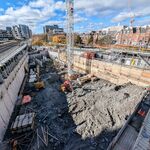Juan_Lennon416
Senior Member
I'd actually like to hear your vision for an Olympic bid, animatronic. You seem pretty savvy. What would you like to see?
We would like to see LA win!
I'd actually like to hear your vision for an Olympic bid, animatronic. You seem pretty savvy. What would you like to see?
I thought about your question, but there's really no scenario that would make bidding preferable to not bidding - and that's including a hypothetical situation where there are no other bidders and we are allowed to re-use all the Pan Am venues without modification.I'd actually like to hear your vision for an Olympic bid, animatronic. You seem pretty savvy. What would you like to see?
I think that Toronto would be an excellent and fully capable Olympic host. That said I would have to say that I don't support a bid at this time. I think Toronto still has some maturing to do and there is a positive momentum of organic growth in the city that needs to play itself out without Olympic disruption. 2024 isn't actually that far away.
I would like civic leaders to not pursue this for another decade and re-evaluate the situation around 2025. By then many of the current infrastructure projects will be complete and our newly densified central district and waterfront will be more mature and lively. Also, hopefully much of the central city will be a little less shabby as the turn-over in property ownership and trend of public space rejuvenation will continue it's virtuous cycle of striving for higher standards.
Given the fact that you propose spending between $15 and $25 billion on a sporting extravaganza, I think the onus is on you to give a data-driven rationale of why this would be a net benefit to the city, where exactly the money is going to come from, and what exactly it will be spent on. Because "Hosting the Olympics will make Toronto one of the world's most influential cities!" isn't verifiable or nearly specific enough.Really, animatronic? I actually would love to hear your vision of the city. I think you're on top of some shit. Let's hear your vision.
You'd like an alternate vision for the city?Really, animatronic? I actually would love to hear your vision of the city. I think you're on top of some shit. Let's hear your vision.
I think that Toronto would be an excellent and fully capable Olympic host. That said I would have to say that I don't support a bid at this time. I think Toronto still has some maturing to do and there is a positive momentum of organic growth in the city that needs to play itself out without Olympic disruption.
https://nowtoronto.com/news/train-wreck/Boutros was chiefly referring to the Scarborough Subway Extension and the way his ex-boss fought for that unnecessary, costly piece of infrastructure for the sake of her impending mayoral bid, contrary to her own earlier and apparently principled position that a light-rail line – that would run 30 per cent further for half the cost, with twice as many stations within walking distance of twice as many people – made far greater sense [...] Stintz may not have been elected mayor, but we've been left with the legacy of her ambition. And not only did mayoral victor John Tory decide a subway would still be the way to go, he had some new ideas of his own.
https://nowtoronto.com/news/train-wreck/Council's approved alignment for the Scarborough Subway Extension [...] runs up McCowan from Eglinton to Sheppard. But the existing GO corridor that SmartTrack would use is just 2.1 kilometres to the west, and moving the subway farther away would, as the Star has explored, add hundreds of millions to its cost and take it through an even lower-density area.
[...]
"You can't fund SmartTrack, and justify SmartTrack, and the Scarborough subway at the same time. You just can't," says Boutros. "Not fiscally, not operationally. So at some point, [Mayor Tory's] gonna have to fish or cut bait on this."
http://people.ucalgary.ca/~hiller/pdfs/Urban_Transformations.pdfThe globalization of the economy has meant that cities are now part of a hierarchy of urban places in which power flows from global cities which serve as command centres and peripheral cities struggle for a significant place within the global urban hierarchy. Of particular importance is the emergence of what has been called the "entrepreneurial city" in which coalitions of urban elites unite to promote the economic development of their city (Harvey, 1988; Hall & Hubbard, 1.998). Elite coalitions involve politicians, planners, real estate developers and business leaders attempting to make their cities more competitive by attracting new sources of funding and direct investment to support various forms of business development and employment creation, as well as to improve the built environment either for its own sake or to change the image of a city. Globalization therefore means greater intercity competition, both nationally and internationally, in which entrepreneurial cities seek a competitive edge.
The role that the Olympics play in place marketing is well known but usually is acknowledged more indirectly ('Whitson & Maclntosh, 1996; Roche, 2000). The emphasis in presentations to the International Olympic Committee (IOC) is usually on the city's technical competencies to host the Olympics whereas the rationales presented to local and national constituencies emphasizes spinoff effects such as employment creation (often not explicitly acknowledged as short term), tax revenues and tourism develop- ment. But lurking not far behind these economic justifications is the global publicity given to the host city that usually results in a concerted public relations effort to market and massage the image of the city throughout the various phases of the Olympic cycle. Urban elite coalitions visualize the Olympics as an opportunity to enhance and broaden the profile of the city not iust for its "demonstration effects" (i.e. to demonstrate that the city has the capacity or ability to host such an event) but to "showcase" the city as an attractive place for investment. In some cases, this is public investment for infrastructural change from higher levels of government (which will be discussed below. but a central goal is also to make the city attractive as a place for private investment, including from international sources (Searle, 2003, p. 125). Cities bidding from developing countries or countries wishing to redefine their global position have been especially attracted to the Olympics for this reason. The Olympics then becomes a tool in the more general goal of greater economic development as represented by urban boosterism (Smyth, 1994). This role of the Olympics has become particularly important in a global economy characterized by more competition between cities. Presumably, then, the ability to mobilize capital for Olympic infrastructure is considered to be symbolic of a city's capacity to compete with other cities by taking on such a large-scale multi-faceted project. But it is not just the Olympic facilities themselves that are important but the supporting infrastructure of transportation, housing and leisure activities that must be upgraded (discussed below) in order to enhance the city's environment and its global appeal.
This is what anti-games bean-counters conveniently overlook. They want to circle the wagons, smugly and nihilistically deconstructing any grand project visions, doing nothing while praying for political miracles as the rest of the world passes us by. It's city planning done by defiant ostriches, heads in the sand and butts in the air.
Deciding as a city to unite around a "no thanks" to the IOC would also be a very powerful tool for city building. In particular it would force politicians to stop chasing after shiny objects and get down to work.
Really, do you speak for everyone? Maybe L.A. is where it's at and you guys are a bunch of losers. Then I'll move to L.A.. Maybe Toronto is incapable of pulling off a successful Olympics.
Natalie JohnsonVerified account@NatalieCTV
According to people involved with potential Toronto Olympic bid, Twitter account @OlympicBidTO is "rogue" and doesn't speak for the bid team
Edelman is leading the official unofficial bid - but that's just a parody feed. Either that or they are phenomenally inept.It was said to be the work of Bob Richardson,.




